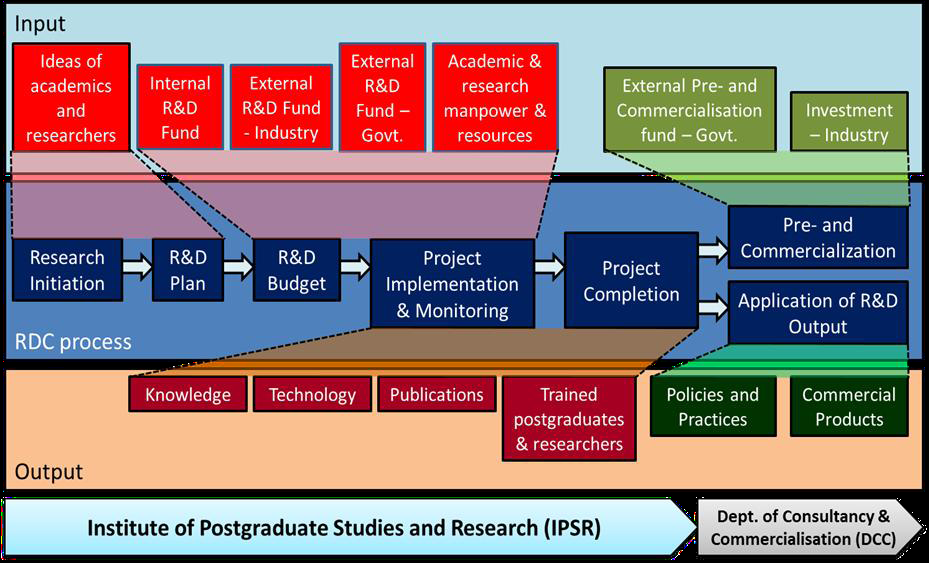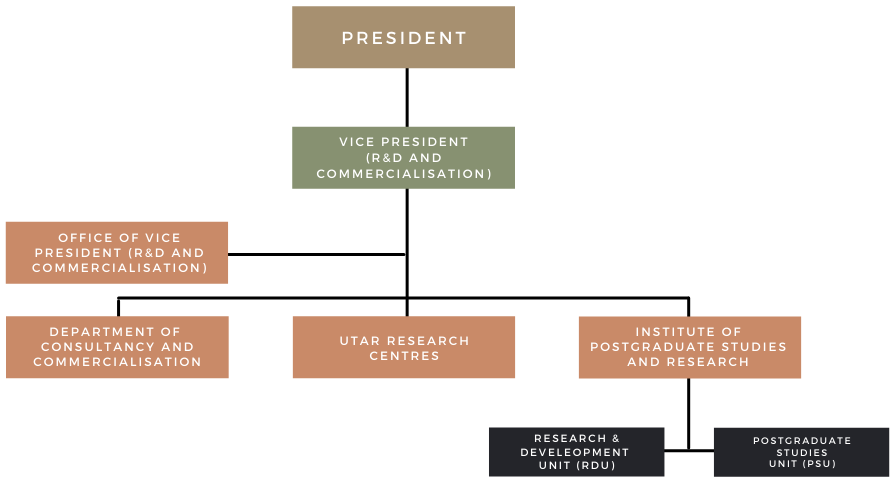
In the year 2020, Universiti Tunku Abdul Rahman (UTAR) continues to make progress and gain recognition as one of the leading research universities in Malaysia. This is the tenth annual report on Research & Development of the university. The Faculties, Research Centres and supporting units made significant progress in the year 2020 as can be seen in their respective reports.
In today‘s highly competitive and globalised environment, it is imperative that organisations such as universities continuously enhance their roles in knowledge and value creation to ensure their relevance to the economy and society. Research, development and commercialisation (RDC) thus become the key activities of universities. UTAR, being one of the many institutions of higher learning in the country, continues to focus and excel in RDC to ensure its long-term survival, relevance and recognition. UTAR has defined and continues to refine its direction and approach in transforming itself into a world recognised research-focused university.
.jpg)
.jpg)
To achieve worldwide recognition, it is imperative that UTAR focus and excel in research, development and commercialisation (RDC) activities. A 5-year research roadmap (2010 – 2014) for UTAR was defined and announced to the university community in August 2009.
The research roadmap is an outline of the important outcomes and the corresponding key performance indicators (KPIs), the recommended approaches and steps for UTAR to pursue in order to achieve Research University status as defined by the Ministry of Higher Education (MOHE) of Malaysia. Clear and measurable key performance indicators (KPIs) were defined and relevant benchmarks were set in the roadmap.
To perpetuate UTAR further into realising its goals, the "UTAR Research, Development and Commercialisation: Enhancement Strategy and Plan for 2013" encompassing detailed improvement plans for Human Resource Development, Research Funding, Postgraduate Programme Promotion and Intake, Data Management & Reporting and UTAR Internal Research Funding Allocation were drawn up and implemented accordingly. The initiatives introduced include UTAR Strategic Research Fund, UTAR Postdoctoral Research Scholarship Scheme, UTAR Research Publication Scheme and UTAR Undergraduate Research Scheme.
Since 2013, UTAR has continued to strengthen its pursuance of certain key milestones as set in the UTAR 10-year Strategic Plan (2013 – 2022). Strategies for each of the following 5 focused areas were formulated under the Research & Development Focused Area of the Strategic Plan.
Over the coming months in 2021, the university will finalise the UTAR Research and Development (R&D) Roadmap for the next 10 years (2022 - 2032). This Roadmap is the start of a big conversation on what actions need to be taken and how we can maximise the economic, environmental and societal impact of research through effective application of new knowledge.
Notwithstanding the Covid-19 pandemic, the UTAR R&D Colloquium 2020 continued to be held via the online platform. Further to the colloquium, potential collaborations are being identified in the areas of AIoT in Healthcare, Revolutionizing Socio-Economic Development with Innovative Technologies, Challenges of Edu-Tourism during COVID-19 Pandemic-Strategy and Social Impact, Sustainable Cities and Communities and Towards Energy & Resource, COVID-19 Pandemic- Impact of COVID-19 on Health and Healthcare Delivery.
Year 2020 saw further enhancements to the:
Financial Support for Journal Paper Publication by Staff (FSJPP) policy and the Research Publication Scheme (RPS) to further encourage UTAR academic staff to publish their R&D findings in Top 10% of Quartile 1 (Q1) journals category as listed in Clarivate Analytics – InCites Journal Citation Report and to allow the utilisation of UTAR Research Publication Scheme (RPS) to cover the over-length page charge of Q1 journals as listed in Clarivate Analytics – InCites Journal Citation Report.
In UTAR, the relevant organisation structure, support and services are shaped and streamlined based on the research, development and commercialisation process chain as depicted in Figure 1.
In UTAR, the entire RDC process chain is handled by the following institute and department:
1. Institute of Postgraduate Studies and Research (IPSR);
2. Department of Consultancy and Commercialisation (DCC).
IPSR consists of two main units:
R&D management and the facilitation of postgraduate studies are two important aspects in every established research university. With both units managed under IPSR, UTAR hopes to achieve coherence and synergy between the two aspects such that greater and more significant output and impact can be generated. In recent years, IPSR has focused and worked on various facets of the RDC process chain to further enhance the processes and outputs in UTAR.

Figure 1: Process Chain, Input and Output for Research, Development and Commercialisation in UTAR
.jpg)
.jpg)
.jpg)
.jpg)
.jpg)
UTAR strongly believes that further steps should be taken to explore on how the findings and output of the project can be applied in real life. Hence, DCC takes on the task to look into the post-completion phase of research projects in UTAR. DCC continues to work closely with IPSR in year 2019 to further enhance the transition of research projects into commercialisation phase. Among the steps taken are as follows:
